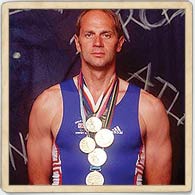History of the Olympics
- Olympia776BC
- Wenlock1850
- Athens1896
- Paris1900
- St Louis1904
- London1908
- Stockholm1912
- Antwerp1920
- Paris1924
- Amsterdam1928
- Los Angeles1932
- Berlin1936
- London1948
- Helsinki1952
- Melbourne1956
- Rome1960
- Tokyo1964
- Mexico1968
- Munich1972
- Montreal1976
- Moscow1980
- Los Angeles1984
- Seoul1988
- Barcelona1992
- Atlanta1996
- Sydney2000
- Athens2004
- Beijing2008
- London2012
-
Winners were crowned with wreaths from a sacred olive tree.
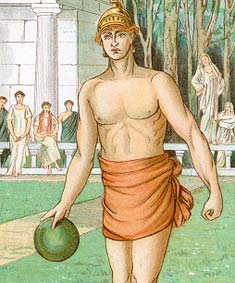
Olympia, Greece
Competing: city states from Ancient GreeceThe Olympics began as the 'Heraea Games' in the original Olympic stadium, and were held in honour of the god Zeus.
The events were mostly running, but also included a pentathlon (running, wrestling, javelin, discus and long jump), boxing, wrestling and chariot racing. The Heraea champions won olive crowns, meat from animals sacrificed to Hera and the right to dedicate statues of themselves in Hera's temple. The Games were at their most popular in Greece until 6BC and then began to wane as the Romans took over. -
Prizes were contributed by English gentlemen.

Much Wenlock, Shropshire
100s of competitors from as far as London & LiverpoolThe first Wenlock Olympic Games take place in Much Wenlock in Shropshire. There are a wide range of games including athletics, quoits and cricket. William Penny Brookes founded the Wenlock Olympian Society "for the promotion of the moral, physical and intellectual improvement of the inhabitants of the town”. The games were visited by Baron Pierre de Coubertin, who was inspired to create the global event we all know.
The name Wenlock has been given to the mascot of the Olympic games this year. -
GB and Ireland won:
232
Athens, Greece
241 Athletes - 14 nations - 43 EventsThis is the first modern Olympic Games, the I Olympiad. No women compete.
Also this year:Blackpool Pleasure Beach amusement park opens. It was founded by Alderman William George Bean, who also opened an amusement park in Great Yarmouth at the same time. The Pleasure Beach later moved to a new site in 1923 and it remains there to this day.
-
GB and Ireland won:
1569
Paris, France
997 Athletes - 24 nations - 95 Events1900 has some of the strangest Olympic events to date – including hot air ballooning, live pigeon shooting, poodle clipping and delivery van driving! 11 women are allowed to compete, in lawn tennis and golf.
Also this year:Elizabeth Angela Marguerite Bowes-Lyon, later to be known as known as Queen Elizabeth the Queen Mother, was born on the 4th August 1900. She passed away in March 2002 at the age of 101. At the time of her death, she was the longest-lived member of the royal family in British history.
-
GB and Ireland won:
110
St. Louis, USA
651 Athletes - 12 nations - 91 EventsThe games last for four and a half months! The opening ceremony is 1st July, with the closing ceremony not until 23rd November.
Also this year:Frederick Henry Royce meets Charles Stewart Rolls to discuss going into business together as Rolls-Royce. Royce had an electrical and mechanical business and made his first car, a two-cylinder Royce 10, in 1904. Charles Roll was the owner a motor car dealership. Initially 4 types of car were made under the name Rolls-Royce.
-
GB and Ireland won:
565139
London, United Kingdom
2,008 Athletes - 22 nations - 110 EventsThe eruption of Mt Vesuvius in 1906 meant that the games, originally planned for Rome, were hastily put together in London instead.
Dorando Pietri, the Italian athlete who won the marathon, had an eventful race! Not only did he take the wrong path, needing to be re-directed by umpires, he also fell over four times, helped to his feet each time. It took him 10 minutes to complete the last 350 metres, but he won the race.
American Johnny Hayes finished second. His team lodged a complaint about the help Pietri received, and Pietri was disqualified. -
GB and Ireland won:
101516
Stockholm, Sweden
2,407 Athletes - 28 nations - 102 EventsWomen compete in swimming events for the first time, but none were American, as their women could only compete wearing long skirts.
Also this year:The bodies of Captain Scott and his team are found in the Antarctic. Scott and his team had set out to be the first people to reach the South Pole, but when they reached it, they discovered the Norwegians had got there first, just 33 days before. The 5 men made their way back, but poor health and extreme weather meant that none returned alive.
-
GB and Ireland won:
151513
Antwerp, Belgium
2,626 Athletes - 29 nations - 154 EventsThe Olympics return in 1920 after being cancelled in 1916 due to WW1. But Germany, Austria, Bulgaria, Hungary, and Turkey are not invited, as they were not part of the Allied forces.
Also this year:The Government proposes a car tax of £1 per horsepower. The Roads Act 1920 required councils to 'register all new vehicles and to allocate a separate number to each vehicle' and 'make provision for the collection of excise duties on mechanically-propelled vehicles and carriages'.
-
GB and Ireland won:
91312
Paris, France
3,089 Athletes - 44 nations - 126 EventsAlso this year:Johnny Weissmuller won 3 Gold medals for the American team in the swimming. He later became a successful actor, starring in twelve films, including his most famous role - Tarzan.
Ramsay Macdonald becomes the first Labour prime minister. He entered parliament in 1906 and had become the chairman on the MPs by 1914.
-
GB and Ireland won:
3146
Amsterdam, Netherlands
2,883 Athletes - 46 nations - 109 EventsWomen compete in track and field events for the first time ever. Luigina Giavotti becomes the youngest medallist of all time, winning silver for Italy when she is just 11 years and 302 days old.
Also this year:Amelia Earhart successfully becomes the first woman to fly across the Atlantic Ocean. She had her first flight in a plane back in 1920 and decided flying was for her. She saved up $100 and began flying lessons in 1921. Sadly, she disappeared in 1937 en route to Howland Island.
-
GB and Ireland won:
475
Los Angeles, USA
1,332 Athletes - 37 nations - 129 EventsDespite being predicted to fail, the games are a huge success, with 37 countries sending athletes to compete in southern California.
Also this year:At the 5th Academy Awards in Hollywood, Walt Disney won a special award Oscar for the creation and popularity of Mickey Mouse. Mickey first appeared in the film in Steamboat Willie in 1928. He has endured lasting popularity and is the official mascot for Walt Disney playing a central role in the Disney theme parks.
-
GB and Ireland won:
473
Berlin, Germany
3,963 Athletes - 49 nations - 129 EventsIn the Winter Olympics, professional ski instructors are banned from the skiing events, because the Olympics were for amateur athlethes only... so Austria and Switzerland boycott the events altogether.
Also this year:King George V dies and his son King Edward VIII becomes the King of England. However, he is in love with a divorced woman. As the head of the Church of England, marrying her is impossible, so King Edward abdicates and leaves for Europe for a new life with his lover.
-
GB and Ireland won:
3146
London, United Kingdom
4,104 Athletes - 59 nations - 136 EventsAfter a 12-year hiatus because of World War II, the Olympics restart. However, Germany and Japan are not invited, and the USSR abstains.
Also this year:UK railways are nationalised to form British Railways. The Prime Minister, Clement Attlee, wants to nationalise public services and so the assets of the four main railway companies (the Great Western Railway, the London, Midland & Scottish Railway, the London & North Eastern Railway and the Southern Railway) all became part of British Railways in 1948.
-
GB and Ireland won:
128
Helsinki, Finland
4,955 Athletes - 69 nations - 149 EventsThe most memorable performance comes from Emil Zátopek of Czechoslovakia, who wins and sets new world records in the 5,000m, 10,000m and the marathon. His wife also wins the women’s javelin.
Also this year:Elizabeth II is crowned the Queen of the United Kingdom and Commonwealth. She married the Duke of Edinburgh in 1947 and they have 4 children. She celebrated her diamond jubilee in 2012: after 60 years as the Queen, she is the 2nd longest reigning monarch in British history.
-
GB and Ireland won:
6711
Melbourne, Australia
3,314 Athletes - 72 nations - 145 EventsThe winner of the hammer throwing contest, Harold Connolly, also wins the heart of the women’s discus champion - Olga Fikotová of Czechoslovakia. Three months after the games end, they marry.
Also this year:Norma Jean Mortenson, born 1926, changes her name to Marilyn Monroe. Her career as a model had led to a film contract in 1946 with Twentieth Century Fox. She was often cast in the 'dumb blonde' role in films such as 'Some Like it Hot' and 'Gentleman Prefer Blondes'.
-
GB and Ireland won:
2612
Rome, Italy
5,338 Athletes - 83 nations - 150 EventsCassius Clay, the 18 year old boxer from Louisville, wins the Olympic light heavyweight crown, beating his Polish opponent Zbigniew Pietryskowsky. Cassius Clay later changed his name to Muhammed Ali.
Also this year:The Beatles perform their first concert in Hamburg, West Germany. One of the most commercially successful bands of all time, the Beatles gained popularity in the UK in the early 1960's and went on to become international stars. They performed their last concert in 1966 and broke up in 1970.
-
GB and Ireland won:
4122
Tokyo, Japan
5,151 Athletes - 93 nations - 163 EventsJapan spends $3 billion rebuilding the city at the world’s first Asian Olympics.
Also this year:The Sun newspaper went into circulation on the 15th September 1964. It has the largest circulation of any daily newspaper in the United Kingdom selling over 2.5 million copies a day. On February the 26th the Sun on Sunday was launched.
-
GB and Ireland won:
553
Mexico City, Mexico
5,516 Athletes - 112 nations - 172 EventsThis is the highest Olympics ever held. It took place 7,349 feet above sea level.
Also this year:The last steam passenger train service runs in Britain. They were still used in industry in to the 1980's. Steam trains had been used for passengers since 1825 when George Stephenson built the Locomotion for the Stockton and Darlington Railway.
-
GB and Ireland won:
459
Munich, Germany
7,134 Athletes - 121 nations - 195 EventsMary Peters wins the Pentathlon for Great Britain at the age of 33.
Also this year:The last trolleybus system in the United Kingdom closes in Bradford. They are electric buses that draw power from overhead wires. They date back to 1882, but didn't arrive in Europe until 1911.
-
GB and Ireland won:
355
Montreal, Canada
6,084 Athletes - 92 nations - 198 EventsThe Romanian gymnast Nadia Comaneci scores seven perfect 10s and wins three gold medals.
Also this year:Apple Computer Company is formed by Steve Jobs and Steve Wozniak. Initially they only sold computers, but in later years they have moved to consumer electronics, including the iPhone, iPod and iPad.
-
GB and Ireland won:
579
Moscow, USSR
5,179 Athletes - 80 nations - 203 EventsThese are the first games to be held in a Communist country.
Also this year:Adam and The Ants sign their first major record deal, and shoot to the top of the UK charts. The 'Antmania' that followed put the band at the forefront of the New Romantic movement.
In 1980, Britons earned an average of £6,000 a year (today's equivalent is £19,000). The average house price in the UK was £13,650. Petrol was just 28p a litre and a loaf of bread was 33p.
-
GB and Ireland won:
51121
Los Angeles, USA
6,829 Athletes - 140 nations - 221 EventsAmong the medal winners for Great Britain are Sebastian Coe (1500m) and Daley Thompson (decathlon).
Also this year:Band Aid releases the charity single 'Do they know it's Christmas'. It was the fastest selling single of all time and sold 1 million copies in the first week of its release.
-
GB and Ireland won:
5109
Seoul, Korea
8,391 Athletes - 160 nations - 237 EventsThe 'amateurs only' rule, which had plagued athletes and officials alike since the beginning of the Olympic Games, is finally overturned. This new rule allows tennis to return to the Games, not having appeared since 1924, when it was eliminated because of professional/amateur difficulties.
Also this year:Following the introduction of the pound coin in 1983, the English pound note ceases to be legal tender. They were first issued by the Bank of England back in 1797 and they appeared in colour in 1928.
-
GB and Ireland won:
5312
Barcelona, Spain
10,621 Athletes - 199 nations - 300 EventsAlso this year:Prince Charles and Princess Diana's marriage begins to fall apart in the public eye. The Sun newspaper publish a telephone conversation between Diana and James Gilbey, who calls her "Squidgy" and tells her he loves her. Charles and Diana's estrangement becomes obvious. The press leaks more taped telephone pillow talk, this time a conversation between Charles and Camilla Parker-Bowles. On December 9th, Buckingham Palace announces the separation of the Prince and Princess of Wales.
-
GB and Ireland won:
186
Atlanta, Georgia
10,318 Athletes - 197 nations - 271 EventsThe 1996 Games were the first Games convened without any governmental support, which made for a controversially commercialised Games. In their defense, Atlanta stated the heavy corporate sponsorship was part of America's culture of capitalism.
Also this year:Motorola released the first ever flip phone, the StarTAC, at a cost of $1000. Its design was inspired by the communicator from Star Trek and over 60 million were sold worldwide.
-
GB and Ireland won:
11107
Sydney, Australia
10,621 Athletes - 199 nations - 300 EventsSir Steve Redgrave won Gold medals in rowing at five consecutive Olympic Games, from 1984 to 2000, making him Britain's greatest ever Olympian. Only four other athletes in Olympic history have equalled this feat.
Also this year:The last FA Cup final is held in the 20th May at Wembley Stadium before it closed in the October and then re-built. Chelsea beat Aston Villa 1-0. The original Wembley Stadium was first opened in 1923, and its twin towers became its distinctive trademark.
-
GB and Ireland won:
9912
Athens, Greece
10,625 Athletes - 201 nations - 301 EventsA record 24 athletes test positive for performance-enhancing drugs, a reminder that today's drug culture is inescapable, even in the ancestral home of the Olympics. In the following Olympics in Beijing, "Zero Tolerance for Doping" was adopted as an official slogan.
Also this year:The strongest earthquake in 40 years of 9.3 magnitude hits the Indian Ocean. The tsunami waves crashed into several coastal areas including Thailand, India and Sri Lanka, killing around 187,000 people.
-
GB and Ireland won:
191315
Beijing, China
10,942 Athletes - 204 nations - 302 EventsAround 3500 babies in China were given the name Aoyun, or "Olympics" in 2008, with many Chinese mothers even trying to give birth on the day of the opening ceremony.
Also this year:The QEII leaves Southampton on her last voyage to Dubai. She was operated by Cunard as a liner and latterly a cruise ship from 1969. In May 1982 the ship took 3000 troops to the South Atlantic to take part in the Falklands War.
-
The Games take place from 27th July to 12th August 2012.

London, UK
The 2012 Summer Olympic Games, officially the Games of the XXX Olympiad, will be in London - the first city to officially host the modern Olympic Games three times.
Also this year:The Diamond Jubilee, marking the 60th anniversary of the reign of Queen Elizabeth II, was a multinational celebration, with an extra UK bank holiday in June. The Thames Diamond Jubilee Pageant was a flotilla of 1000 boats in honour of the Queen, while street parties were held nationwide.
Win a hamper!
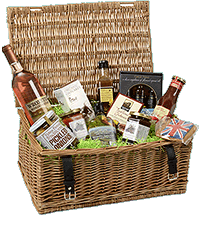
Answer these 3 questions correctly and you could be in with a chance of winning one of our fabulous prizes. All of the answers can be found on our special Games pages. You do not need
to be subscribed to enter. Send your entries to competitions@
genesreunited.co.uk by 5pm on Monday the 20th August. The winners will be picked at random and notified by us.
1). What year were the first modern Olympics games held?
3). How many Gold medals did Johnny Weissmuller win in 1924?
3). What is the name of Jayne Torvill’s mother?
First prize: a Wenlock hamper worth £85, kindly donated by the Heart of England Fine Foods.
Runners up prizes: a retro Olympic poster donated by I love Retro and an Olympic legends map donated by the Transport for London shop.
Terms and conditions apply.
Celebrity Athlete Ancestry
 Our resident genealogist, Anthony Adolph, has worked out the ancestry of three famous athletes all the way back to the 17th Century!
Our resident genealogist, Anthony Adolph, has worked out the ancestry of three famous athletes all the way back to the 17th Century!
Read their fascinating stories below...
Steve Redgrave
Having set out to win three Olympic Gold Medals at the beginning of his career, Steve went on to win an incredible five Golds in five successive Olympic Games from 1984 to 2000. Anthony Adolf explores the Redgrave family history.
Read more about
Steve Redgrave's ancestry...
Roger Bannister
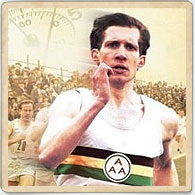
Roger Bannister
DOB: March 1929
Nationality: British
Sport: Running (800m, 1500m, 1 mile)
Medals: One gold at Commonwealth Games
Sir Roger Gilbert Bannister is an English former athlete, best known for being the first person to run a mile in less than 4 minutes, in 1954. Anthony Adolf delves into the Bannister past.
Read more about
Roger Bannister's ancestry...
Jayne Torvill
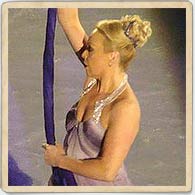
Jayne Torvill
DOB: October 1957
Nationality: British
Sport: Ice Dancing
Olympic medals: 1 gold, 1 bronze
Jayne Torvill OBE is a British ice dancer, best known for being one half of Torvill and Dean, from the TV show Dancing on Ice. With her skating partner Christopher Dean, Jayne has won two Olympic medals. Anthony Adolf tells us about the Torvill roots.
Read more about
Jayne Torvill's ancestry...

